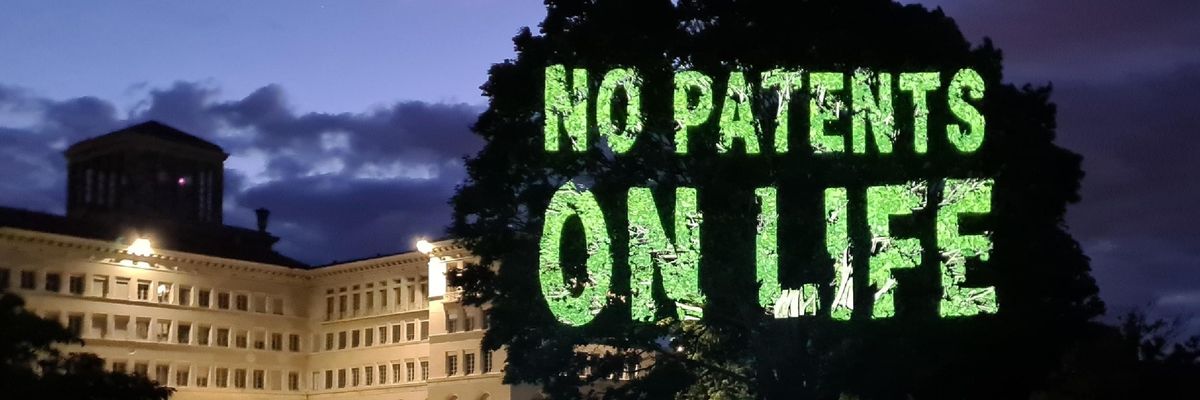Global public health campaigners are lashing out at the leadership of the European Union for attempting to undercut a temporary patent waiver for coronavirus vaccines by pushing an alternative proposal that critics say would fail to address supply shortages or stark inequities in vaccine distribution.
"The E.U. and other nations opposing this waiver need to stop blocking other countries' efforts to protect their populations in a public health emergency."
--Dimitri Eynikel, Doctors Without Borders
On Friday, the E.U. submitted to the World Trade Organization a plan that touts "voluntary solutions and public-private cooperation" as the best way to ramp up vaccine production, not a temporary suspension of intellectual property rights that have given pharmaceutical companies monopoly control over manufacturing.
"Many such partnerships are already under way, including with many producers in the developing world. We need more of these," reads the proposal, which mentions compulsory licensing as "an important and perfectly legitimate fallback" should voluntary agreements fail.
Doctors Without Borders, U.S.-based consumer advocacy group Public Citizen, and other organizations were outraged by the E.U.'s counterproposal, warning Monday that it would rely heavily on the same strategy that has yet to produce a sufficient supply of vaccine doses and distribute them equitably. According to the World Health Organization, low-income countries have administered just 0.4% of the world's coronavirus vaccine doses while rich nations have administered 44%.
A recent analysis by a coalition of humanitarian groups estimates that at the current vaccination rate, it would take low-income countries 57 years to fully vaccinate their populations against Covid-19.
"The E.U. 'plan' is to urge current vaccine makers to produce more, an approach that already has failed spectacularly and now imperils the world," Public Citizen said in a statement Monday. "The E.U.'s latest WTO submissions closely hew to the Big Pharma talking points leaked last month. They include the colonialist insinuations that developing countries do not understand what is in their own interest and cannot act for themselves. They assume that the press and public do not understand that the supply chain 'bottlenecks' that the EU claims are the issue are in no small part caused by IP barriers that limit production of Covid-19 vaccine inputs as well as finished vaccines, not by 'trade barriers,' as the EU claims."
"The EU touting compulsory licensing as the way forward is even more cynical," Public Citizen added, "given decades of developing countries' attempts to use compulsory licensing being viciously attacked with trade threats and more by rich countries, including the E.U. and its member nations."
Backed by more than 100 nations and recently endorsed by the United States, the proposed waiver of the WTO's Trade-Related Aspects of Intellectual Property Rights (TRIPS) agreement was first introduced last October by India and South Africa.
After months of negotiations that have made little headway thanks to continued opposition from Germany, Canada, the United Kingdom, Switzerland, and other wealthy nations, the WTO's TRIPS Council is set to meet again on Tuesday and Wednesday to discuss the patent waiver and proposed alternatives.
Ahead of the meetings, E.U. member nations faced growing grassroots pressure to end their opposition to the patent waiver as the pharmaceutical industry--looking to maintain its profitable stranglehold on vaccine production--lobbies aggressively to uphold the status quo.
In a statement on Tuesday, Doctors Without Borders slammed the E.U.'s counteroffer as "weak and an attempt to derail the will of more than 100 countries."
"The EU's continued insistence on the use of compulsory licensing in its counterproposal as an excuse for opposing the original TRIPS waiver is disingenuous and endangers public health globally," said Dimitri Eynikel, E.U. policy adviser for Doctors Without Borders' Access Campaign. "In this raging pandemic, countries need to have all options at their disposal to encourage the manufacturing of Covid-19 medical tools across the world. The E.U. and other nations opposing this waiver need to stop blocking other countries' efforts to protect their populations in a public health emergency."
Fresh calls for the E.U. to end its stonewalling of the patent waiver came as coronavirus cases are rising sharply in South America, Africa, and other regions that have struggled to achieve widespread vaccination as rich countries continue to hoard doses and key technology. The U.K., one of the most prominent opponents of the patent waiver, is also experiencing an uptick in cases.
"Increasingly, we see a two-track pandemic," WHO Director General Tedros Adhanom Ghebreyesus told reporters at a press conference in Geneva on Monday, lamenting that vast inequities in vaccine distribution haven't "changed in months."
According to the People's Vaccine Alliance, more than a million people have died of Covid-19 since the leaders of G7 nations pledged in February to bolster vaccination campaigns in low-income nations--a vow that did not include support for a temporary patent waiver.
"Eight people have died from Covid every minute since G7 leaders last met," Fatima Hassan, founder and director of the Health Justice Initiative in South Africa, said in a statement. "That's more than a million lives lost, while just a few countries, including the U.K. and Germany, continue to block proposals to waive patents on Covid-19 vaccines and treatments which would enable every qualified manufacturer in the world to produce vaccines instead of a handful of U.S. and European pharma corporations."
"Whatever pledges and promises the G7 make," Hassan added, "they are still leaving pharmaceutical corporations to decide who lives and who dies, unless they back the ending of these Covid vaccine monopolies."




